A collection of videos relating to the diagnosis and treatment of eye movement disorders. This collection includes many demonstrations of examination techniques.
Dan Gold, D.O., Associate Professor of Neurology, Ophthalmology, Neurosurgery, Otolaryngology - Head & Neck Surgery, Emergency Medicine, and Medicine, The Johns Hopkins School of Medicine.
A collection of videos relating to the diagnosis and treatment of eye movement disorders.
NOVEL: https://novel.utah.edu/
TO
Filters: Collection: ehsl_novel_gold
1 - 25 of 8
| Title | Description | Type | ||
|---|---|---|---|---|
| 1 |
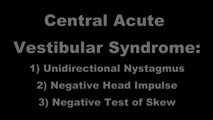 |
Central Acute Vestibular Syndrome Due to Posterior Fossa Hemorrhage | This is a patient presenting with the acute vestibular syndrome (AVS, e.g., acute prolonged vertigo, spontaneous nystagmus) whose HINTS (Head Impulse, Nystagmus, Test of Skew) testing indicated a central etiology based on negative (normal) head impulse testing (HIT). Nystagmus was unidirectional and... | Image/MovingImage |
| 2 |
 |
Demonstration of HINTS Examination in a Normal Subject | In the acute vestibular syndrome - consisting of acute prolonged vertigo, spontaneous nystagmus, imbalance, nausea/vomiting, head motion intolerance which is typically due to vestibular neuritis or posterior fossa stroke - a 3 step test of ocular motor and vestibular function known as HINTS, has hig... | Image/MovingImage |
| 3 |
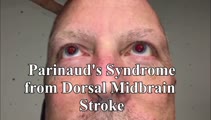 |
Parinaud's Syndrome with Impaired Upward Saccades and Otherwise Normal Vertical Eye Movements | This is a 50-yo-man who suffered a dorsal midbrain stroke. Exam demonstrated normal vertical range of eye movements, normal vertical VOR and smooth pursuit, but inability to perform upward saccades. Another feature of Parinaud's syndrome seen on his exam was light-near dissociation (not shown in thi... | Image/MovingImage |
| 4 |
 |
Semicircular Pathways | Once the semicircular canal fibers leave the peripheral labyrinth, they synapse in the ipsilateral vestibular nucleus, and then ascend to the ocular motor nuclei. This enables the vestibulo-ocular reflex to respond to head movements in the plane of any canal or combination of canals. | Text |
| 5 |
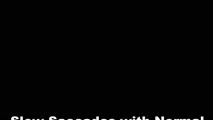 |
Slow Volitional Saccades and Poor Fast Phases to an Optokinetic Stimulus, with Preserved Head Impulse Testing | This is a 67-year-old woman presenting with imbalance and binocular horizontal diplopia at near. On examination there were frequent square wave jerks, limited supraduction OU and convergence insufficiency, which explained her diplopia. Pursuit and suppression of the vestibulo-ocular reflex were sa... | Image/MovingImage |
| 6 |
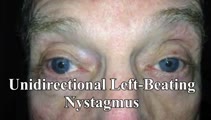 |
Unidirectional Vestibular Nystagmus | 60-yo-man with recurrent vertigo attacks - this video was taken during one of his typical attacks, and shows left-beating nystagmus that stayed left-beating in all directions of gaze, more in left gaze (in accordance with Alexander's Law), and less in right gaze. This pattern is more commonly seen w... | Image/MovingImage |
| 7 |
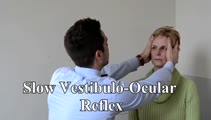 |
VOR (Slow and Fast) | 𝗢𝗿𝗶𝗴𝗶𝗻𝗮𝗹 𝗗𝗲𝘀𝗰𝗿𝗶𝗽𝘁𝗶𝗼𝗻: Slow vestibulo-ocular reflex (VOR): Since smooth pursuit and VOR systems are both active, if eye movements are choppy with this maneuver this implies deficits in both pursuit and the vestibular system as in CANVAS; Fast (... | Image/MovingImage |
| 8 |
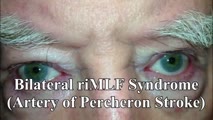 |
riMLF Syndrome from Artery of Percheron Stroke | 𝗢𝗿𝗶𝗴𝗶𝗻𝗮𝗹 𝗗𝗲𝘀𝗰𝗿𝗶𝗽𝘁𝗶𝗼𝗻: This is a 65-yo-man who suffered the abrupt onset of loss of consciousness followed by difficulty looking down. MRI showed bilateral rostral midbrain strokes in the distribution of the artery of Percheron. He could not in... | Image/MovingImage |
1 - 25 of 8
